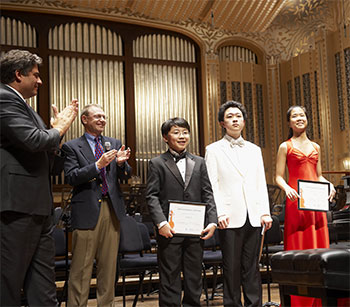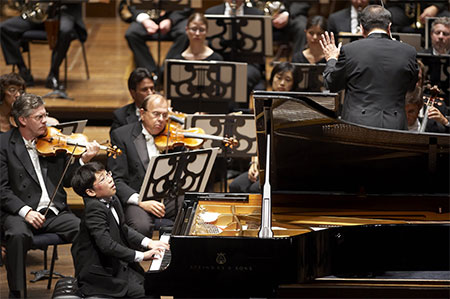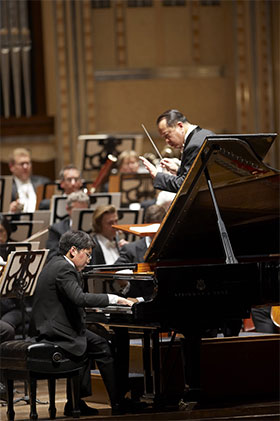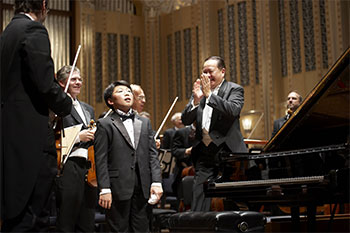Cleveland, OH, August 2, 2010

Dean David Stull of the Oberlin Conservatory and donor Thomas Cooper present 1st, 2nd and 3rd prizes to George Li, John Chen and Kate Liu (photo: Roger Mastroianni)
by Daniel Hathaway & Nicholas Jones
In the debut of the Thomas and Evon Cooper International Piano Competition at the Oberlin Conservatory last week, first there were forty-three contestants, then after the first round, twenty-three. Eleven were chosen for the concerto with piano round, then six for the solo finals. On Friday evening, three young pianists, one 14 and two 16 years old, competed in the final round in Severance Hall with Jahja Ling and The Cleveland Orchestra for several thousand dollars in prize money (they already had won four-year, full tuition scholarships to the Oberlin Conservatory). The top winner would go on to play engagements with professional orchestras in Beijing and Shanghai.
It must have been a heady week for the more than forty contestants, who ranged in age from 13 to 18, and who were as finely tuned up as young tennis players for this demanding week of elimination rounds, in this case in front of an international jury of distinguished judges.
Out of deference to the age and comparative inexperience of some of the younger competitors, we began our coverage of the Cooper Competition with the Tuesday concerto round, when eleven pianists made their first appearances on the Warner Hall stage at Oberlin as interactive soloists.

The eventual third-place winner, 16-year old Kate Liu from Chicago, had impressed us on Tuesday in the third movement of Prokofiev’s Third Concerto. Her bright, strong, clearly articulated and highly rhythmic version of this dazzling finale was characterized by well-balanced colors, crystalline runs and a thrilling dash to the finish line. She also looked like she was having a fine time under fire that night.
Ms. Liu also radiated delight on Friday, the second contestant to play. It was obvious from the start that she loves the Prokofiev concerto: she launched into its angularity with verve and rhythmic delight. The percussive excitement and spark showed a gutsy soul, tackling a knotty piece with obvious intelligence and great skill. In the quieter passages, Ms. Liu played beautifully, with a subtle range of color and a fluid complexity of interpretation.
Sometimes you just need to be a little older and stronger to tackle some works in the concerto repertory. Often on Friday evening, Ms. Liu seemed to be more part of the orchestra than a soloist in front of it. What she didn’t pull off was the sense of the concerto as (in Prokofiev’s term) an “argument” with the orchestra. Her playing was not strong enough to be heard against the appropriately big, brassy sounds of the orchestra (and she happened to choose the darker sounding of the two available Steinways). If there was an argument, we missed one side of it.
On Tuesday, 16-year old John Chen from Leesburg, Virginia (who was awarded second prize), was strong and impressive in the first movement of that old Van Cliburn warhorse, Tchaikovsky No. 1. Nearly overpowering his ‘orchestra’, he strummed rich chords at the beginning, then took us on a sometimes breathless ride through the rest of this famous movement. Choosing not to linger over big tunes or lyrical moments, Mr. Chen consistently pressed forward, delivering a version of Tchaik 1 which was long on energy and excitement but could have benefited from more contrasts in color, mood and dynamics.

But on Friday evening, Mr. Chen’s plan was more like an immutable script. From time to time, it seemed he forgot he was sharing the stage with an orchestra that also had something important to contribute to the dialogue, and he passed up a number of opportunities to slow down and enjoy the scenery. The Tchaikovsky is a bit of a temptation for a pianist with Mr. Chen’s strength: its big moments are so big and important that it can be hard to leave room for the other moods – the folksy, the jokey, and the mysterious. Under the pressures of a competition, a debut in Severance Hall, and with the Cleveland Orchestra behind you, it must be especially tempting to stay with the big sound, and unfortunately that’s what Mr. Chen did. With his talent, he’ll certainly learn more, and probably very soon, about playing with, not over the top, of the other players (the cello solo in the second movement, for example) and of the music itself.
The first place winner, 14-year old George Li from Lexington, MA was the standout in the morning concerto round on Tuesday. He played the opening movement of Chopin’s first concerto with assurance and accuracy. Mr. Li looks small for his age but plays with a strong, clear tone. He nailed the tough passages handily and shaped phrases expertly with an attractive lyricism. There might have been a bit more poetry at certain moments, but this was an impressive showing.
On Friday evening, Mr. Li, who played first, seized your attention from the beginning. While he sat at the piano, listening intently during the orchestra’s introduction to the Chopin, some of us were wondering whether this boy could manage that big Hamburg Steinway. But his first chords were unforgettable, even I would say, astonishing: clear, powerful, like great bells in a cathedral. He took command of our ears in a moment, and he kept that command throughout. Mr. Li knew how to play Chopin’s wonderful heroics, but he also knew how to whisper, a kind of whisper that didn’t fade away, but demanded even more attention from us. His dreamy lyricism – notes like pebbles dropping into a pond — alternated with a Romantic turbulence that gave meaning and soul to Chopin’s signature musical swirls of notes.
Mr. Li also did a masterful job of communicating with his orchestral colleagues and acknowledging their essential role in putting the concerto across. During his rests, Mr. Li listened to the orchestra with his body as well as his ears, almost playing the piece along with the other musicians. Among the three finalists, Mr. Li is the only one who cites chamber music in his bio, and it shows: he has already built that chamber-music sensibility of give-and-take.
And if anyone thinks that Mr. Li was cowed by the prospect of playing with the resident ensemble of Severance Hall, his performance showed otherwise. Jahja Ling opened the Rondo-–Vivace at a tempo a little closer to allegro. One might expect a 14-year old to have some trepidation about driving the Cleveland Orchestra, but it didn’t seem so to me: Mr. Li came in pushing the tempo hard (and of course the orchestra responded). It was as if he was saying, “enough of the dreamy second movement: let’s have some fun” (after all, his part is marked “scherzando”). Each time he came back with the rondo theme, he pumped it with an impish energy. He gave us what a final movement in a concerto should do: enough excitement to get the blood moving.

Nicholas Jones muses about this subject:
“I wonder what these talented young musicians will be doing in ten or twenty years. I hope they will be playing music: certainly their success here gives every indication of promise that way. More than likely, they will be playing concertos like these with major orchestras around the world. But I also wonder how they will further develop the soul that each of them already shows. One of the prizes for each of these winners is a full scholarship to Oberlin. Even if they don’t study there, I hope they will go to a school where the liberal arts joins with the development of such talent as they have, where they can broaden and deepen. Perhaps I’ll end up with one of them in my Shakespeare class, where we can explore those age-old, always-new texts and their insights into the soul.
“Like Yo-Yo Ma, will one of these players major in Philosophy? Will one of them, like Jennifer Koh, begin to explore the knotty world of contemporary music? Will one, like competition judge Malcolm Bilson, turn to early music and its intriguing problems of interpretation? Will one of them, like Gustavo Dudamel, draw into music the legions of the poor and oppressed?”
It will be interesting to keep an eye on not only the final three but the original forty-three pianists as their careers progress. Next year in Oberlin: the Cooper International Violin Competition.
Nicholas Jones is Professor of English at Oberlin College and a regular correspondent for ClevelandClassical.com. This article is cross-posted on the Commentary page of the website.
Photos by Roger Mastroianni courtesy of the Oberlin Conservatory of Music.


